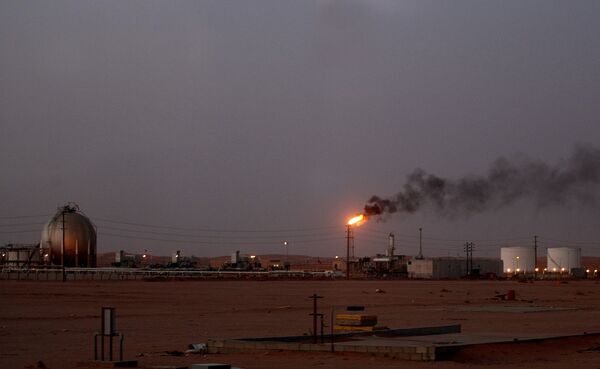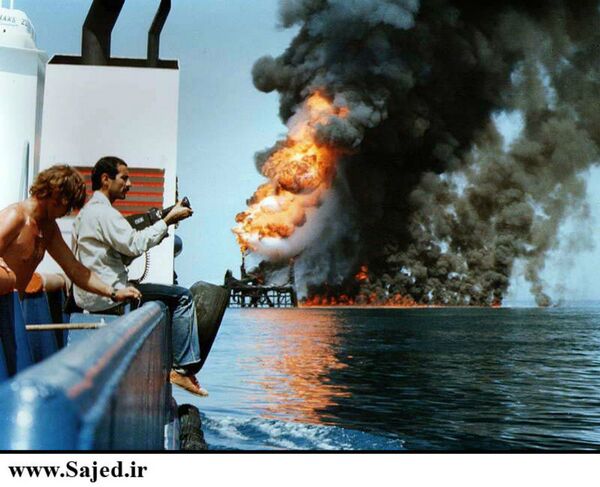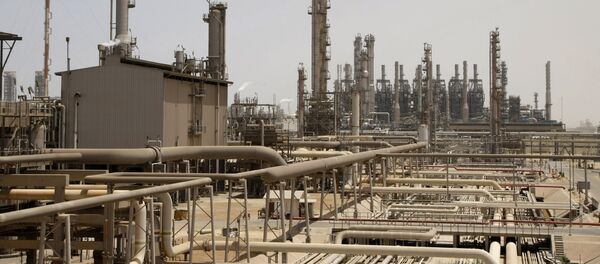Following the February 16 meeting of Saudi Arabia, Qatar, Venezuela, OPEC and Russia's energy officials in Doha, Russia's Energy Minister Alexander Novak told the "Vesti on Saturday" program that the consultations on oil production stabilization are expected to be over by March 1.
"We agreed that all consultations should be over by March 1," Novak said, adding that the countries who support the freeze account for 75 percent of total oil exports.
Over the past year and a half crude prices have crashed 70 percent. Given the preliminary agreement concluded by the oil ministers, is it possible that we will see an increase in the oil price in the near future?
"'Freezing' at present output levels by Saudi means the over-production will continue," American researcher, historian and strategic risk consultant F. William Engdahl pointed out an exclusive interview with Sputnik.
According to the researcher the current oil price slump is a reflection of a deeper, long-term strategy by the Anglo-American oil moguls.
"The post-September, 2001 Anglo-American strategy has been to destroy, one by one, the independent state-owned oil companies of the entire Middle East beginning with Saddam Hussein's Iraq. Dick Cheney as CEO of Halliburton [one of the world's largest oil field services company] said as much in a 1999 speech in London," Engdahl continued.
Indeed, in his 1999 speech, just four years before the US' Iraqi invasion, Richard Bruce Cheney said:
"By 2010 we will need on the order of an additional fifty million barrels a day. So where is the oil going to come from?… While many regions of the world offer great oil opportunities, the Middle East with two thirds of the world's oil and the lowest cost, is still where the prize ultimately lies."
According to Cheney, technology, privatization and the opening up of a number of countries could create new opportunities for oil corporations.
However, regional state-owned oil companies constitute a kind of obstacle in the way of major oil producers' expansion.
In this light it is hardly surprising that Cheney, the 46th Vice President of the United States from 2001 to 2009, supported the invasion of Iraq under former President George W. Bush.
However, you would be surprised to know that in 1994 Dick Cheney, who also served as the Secretary of Defense between 1989 and 1993, strongly opposed a potential US military campaign against Saddam Hussein. He warned that the invasion would create a quagmire in the Middle East and result in the splitting of Iraq. That means, US political establishment was fully aware of the consequences of their future adventure.
"Then in 2010 they escalated to the Arab Spring, to destroy Qaddafi's Libya, Egypt, Syria, oil and gas pipelines," Engdahl underscored.
"Ultimately, the plan is to destroy Saudi Arabia as well as Syria and Turkey in order to destroy any independent Saudi or other Middle East oil power [Anglo-American financial and political establishments] do not fully control. They are letting the situation of oil prices bounce on the bottom to gain that end — re-control of the global oil and gas market in hands of their Wall Street and City of London bankers," the researcher told Sputnik.
Is it possible that European and American "oil barons" are pressuring the petroleum-dependent economies into privatizing their oil sector in order to buy their assets?
"Privatization of state oil companies is the dream of the Wall Street Oil Barons, especially those of Russia, since 1990. Nations and states should hold on to strategic assets, not sell them one-off for a song, whether national railways or state oil and gas companies," Engdahl emphasized.
Indeed, Riyadh, struck by the oil slump has already begun discussing the privatization of Saudi Aramco — the Saudi national petroleum and natural gas company based in Dhahran.

"I have recently written and say here again, the, as you refer to them, Oil Barons — the Anglo-American bankers who today control oil markets of the world via derivatives, manipulation of markets, via the role of the dollar as reserve currency — plan to de facto destroy Saudi Arabian oil hegemony, destroy Turkish Erdogan's ambitions, even if it means the destruction of much of the oil states of the Middle East," the researcher elaborated.
"Then of course the oil price will rise, but at what a cost," he stressed.
Given the current level of demand, an oil price hike is impossible. However, a global infrastructural/industrial project could potentially save the day by increasing the demand sharply.
Can the ambitious Chinese-led New Silk Road project result in crude prices rising?
"The China-led New Economic Silk Road is a beautiful project and could lift the entire world out of economic misery, especially in connection with Russia and the Eurasian Economic Union countries and with Iran," Engdahl told Sputnik.
The researcher underscored that the issue is far more complex: it is not about the recovering of oil prices but about the hegemony of the dollar-based system, used as a stick to beat those unwilling to bow before the Western financial and political establishment.
"The connection with oil prices for that is a topic far more complex. It would require that the steps begun in the past three years by China, by Russia especially, to de-dollarize their mutual trade, to de-dollarize, as Russia is in the process of doing, by creating a Urals benchmark at the St. Petersburg Exchange, and such steps, be accompanied by fundamental changes in the status of the central bank, that it be a national bank in state hands, with an explicit mandate not to control inflation against the US dollar, but to issue state credit to build the Russian economy, along the lines begun by Pjotr Stolypin, Sergei Witte and others in earlier times," Engdahl elaborated.






